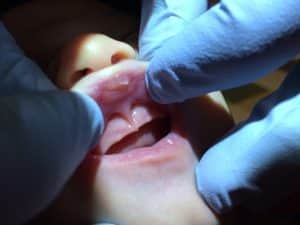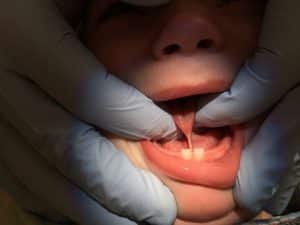Effective Infant Frenectomy Treatment
If you’d like learn more about infant frenectomies then please continue reading below or learn about our adult frenectomy services.
What is a Tongue Tie or Lip Tie?
A lip or tongue tie is caused by a labial or lingual frenum (or frenulum). The frenum is a remnant of tissue in the midline. It is either between the undersurface of the lip and gums or the tongue and the floor of the mouth. If the frenum is too restrictive, it can interfere with breastfeeding and is treated with an infant frenectomy. A restrictive frenum is commonly called a lip tie, tongue tie or tethered oral tissue (TOTs).
What is an Infant Frenectomy?
An infant frenectomy is a procedure that can be performed on children who have a medical condition called tongue-tie. Tongue-tie occurs when the thin piece of tissue (frenulum) connecting the bottom of the tongue to the floor of the mouth is shorter than usual, making it difficult for the child to move their tongue. In some cases, a frenectomy is recommended to help the child feed, speak and breathe better.
A laser frenectomy can be performed on infants in order to provide relief from tongue-tie symptoms such as difficulty breastfeeding, speech delays and poor oral hygiene. During a laser frenectomy, a special dental laser is used to remove the frenulum in a few minutes. The procedure is quick and has minimal downtime, meaning the child can return home shortly afterwards.
Why Choose a Laser Frenectomy for Your Infant?
The CO2 laser used at Inspire Dental Wellness offers a precise, safe method for removing the frenulum tissue. Laser treatment ensures minimal bleeding and faster healing, with infants often able to feed more comfortably immediately post-procedure. This advanced technology also reduces the risk of infection, making it an ideal option for infants.
Is Your Baby a Candidate for Frenectomy? Key Signs to Look For
If your baby experiences symptoms like difficulty latching, slow weight gain, or reflux, they might benefit from an evaluation. For parents and breastfeeding mothers, common indicators include ongoing nipple pain, recurrent blocked ducts, or discomfort during feeding sessions. Early intervention with frenectomy can make a significant difference, fostering a more comfortable experience for both mother and baby.
Request More Information
Patient Testimonials
Many parents find relief and joy following a frenectomy, as babies exhibit improved feeding behaviors, weight gain, and comfort. Inspire Dental Wellness is proud to support families through this journey, offering compassionate, skilled care every step of the way.
"He's a "TOTALLY DIFFERENT BABY" after his lip & tongue tie releases!"
When Hayden was just 1 month old, Emily noticed he was not gaining weight, was colicky, problems with eating/taking a bottle, and was even projectile vomiting. After seeking help from multiple healthcare providers, she found her way to us at Inspire Dental Wellness from her lactation consultant. Emily was more than willing to make the long drive to Orland Park all the way from the Kankakee area for Hayden to be treated!
"He latched without pain right after his procedure!
Third-time mom, Amber, brought her baby, Beckett, into Inspire Dental Wellness seeking answers about his suspected tongue tie. Beckett had a difficult time nursing, favoring 1 brand of nipple shields, and still dealing with colicky behavior. After his releases with Dr. Erica, Amber stated that he is a COMPLETELY different baby!
Painful Breastfeeding Problems SOLVED by mini Sproutz™
Paige and her 4 month old son came to Inspire Dental Wellness seeking help for latching issues with breastfeeding. After evaluation, Dr. Erica diagnosed Wyatt with an upper lip tie, posterior tongue tie, and bilateral cheek ties. Paige felt supported from beginning to end.


These may be some signs of tongue tie or lip tie
- nipple pain and/or nipple erosion
- nipple looks pinched, creased, bruised, or abraded after feeds
- white stripe at the end of the nipple
- painful breasts or vasospasm
- poor milk supply
- plugged ducts
- mastitis
- recurring thrush
- frustration, disappointment, and discouragement with breastfeeding
- weaning before mom is ready
- poor latch and suck
- fussiness and frequent pulling away from the breast
- clicking sound while nursing (which can mean poor suction)
- unusually strong suck due to baby using excess vacuum to remove milk
- ineffective milk transfer
- spilling milk during feeds
- jaw quivering after or in between feeds
- inadequate weight gain or weight loss
- irritability or colic
- gas and reflux
- gets tired about 1 to 2 minutes into nursing
- sliding off the breast gradually
- chewing or biting on the nipple
- falling asleep at the breast without finishing a full feed
- coughing, choking, gulping, or squeaking when feeding
Recognizing the Need for an Infant Frenectomy
An infant frenectomy can be transformative for babies struggling with feeding due to tongue or lip ties. These ties are caused by a restrictive frenum, which can interfere with a baby’s ability to latch properly, resulting in difficulties for both baby and breastfeeding mother. Common signs in infants include poor latch, fussiness, weight loss, and reflux, while mothers may experience pain and issues like blocked ducts. Addressing these ties early supports better feeding and growth, and in some cases, speech and dental health benefits as the child matures.
How Infant Frenectomy Benefits Breastfeeding
Tongue-tie affects breastfeeding by limiting the baby’s tongue mobility, preventing effective milk transfer. This can lead to insufficient milk intake, causing weight issues and fussiness in the baby, while mothers may feel discomfort, discouragement, and frustration. With an infant frenectomy, babies often experience immediate improvement, latching more comfortably and effectively. This provides relief for both mother and baby, fostering a smoother breastfeeding journey and potentially prolonging the breastfeeding period, allowing infants to gain the full range of health benefits.
Why Laser Frenectomy?
A laser frenectomy is a gentle, precise option that minimizes trauma to surrounding tissues. The LightScalpel CO2 laser used by Dr. Erica Zolnierczyk at Inspire Dental Wellness allows for a clean, quick cut that minimizes bleeding and reduces the risk of infection. This approach allows infants to return to regular feeding routines immediately after the procedure, with minimal discomfort and rapid healing.
What to Expect Before, During, and After the Procedure
Prior to an infant frenectomy, Dr. Erica Zolnierczyk conducts a thorough evaluation to confirm the diagnosis of tongue or lip tie. This may include a detailed consultation with parents to discuss symptoms and ensure they understand the procedure’s benefits. During the procedure, which lasts only a few minutes, the CO2 laser is used to release the restrictive frenulum. After the frenectomy, gentle stretches and specific exercises may be recommended to promote healing and prevent reattachment, ensuring a lasting improvement in mobility.
Consequences of Not Treating Tongue Tie or Lip Tie
If left untreated, the tissue does not stretch or rip on its own. At best, the infant/tongue tied baby will learn to compensate to eat. At worst, the breastfeeding relationship will suffer and/or end. Later in life there may be difficulty chewing and/or swallowing certain solid foods. It may lead to delayed or difficult to understand to speech. It most likely will alter facial growth possibly causing jaw problems, inadequate space for teeth leading to crowding and the need for orthodontics, and possibly sleep apnea.
Understanding Tongue-Tie and Lip-Tie: What Causes These Conditions?
Tongue-tie, medically known as ankyloglossia, occurs when the lingual frenulum—the band of tissue under the tongue—is too short or thick, restricting the tongue’s movement. Lip-tie is a similar condition, where the upper lip frenulum is overly restrictive, limiting the baby’s ability to flange their upper lip during breastfeeding. Both conditions can be present at birth and are thought to have genetic factors, making them more common in families with a history of tongue or lip ties. Early detection is key, as these ties can impact feeding, dental health, and, in some cases, speech development as the child grows.
The Impact of Tongue and Lip Tie on Infant Development
Beyond breastfeeding challenges, untreated tongue-tie and lip-tie can have lasting effects on a child’s development. Restricted tongue movement can limit the baby’s ability to move food around the mouth, potentially leading to feeding difficulties during the transition to solid foods. In older children, tongue-tie can even affect speech clarity and dental alignment, leading to the need for orthodontic treatment later. Addressing these ties early supports a foundation of healthy eating habits, effective oral function, and proper speech development, promoting overall wellness for the child.
How we Perform Infant Frenectomies / Lingual Frenectomy
In our office, Dr. Erica corrects the altered frenum/tongue tie by doing a frenectomy with the LightScalpel CO2 laser. Most infants will nurse immediately following the procedure. However, we do not expect full resolution of symptoms right away. This would be equivalent to expecting full recovery after an ACL surgery. We do a comprehensive exam and evaluate a multitude of parameters prior to proceeding with a frenectomy to ensure success for our mothers and infants. Fortunately, we work with a great team of professionals to support you and your little one on this journey.
Together, we’ll do everything possible to help your little one grow up happy, healthy and strong. If you are wondering if you have a tongue tied baby then give our office a call at 708-272-1211 to schedule a consultation or fill out the form below and our office will reach out to you.
Signs of Tongue and Lip Tie in Babies and Mothers
Both infants and mothers can experience a range of symptoms due to tongue or lip ties. Babies often show signs like poor latch, fussiness, gas, reflux, and inadequate weight gain. Many parents notice their child frequently pulling away from the breast, spilling milk, or struggling to stay latched. For breastfeeding mothers, symptoms can include nipple pain, plugged ducts, and mastitis. These issues, often resulting in frustration and discouragement, can be resolved with a frenectomy, enhancing comfort for both baby and mother and supporting a positive breastfeeding experience.
Supporting the Breastfeeding Journey with Infant Frenectomy
At Inspire Dental Wellness, we understand the challenges that parents face when breastfeeding complications arise. Dr. Erica Zolnierczyk and her team work closely with lactation consultants to ensure comprehensive support during and after the frenectomy procedure. This collaborative approach empowers mothers to navigate the recovery phase with confidence, enabling a smoother and more enjoyable breastfeeding journey. Many mothers report relief from pain, improved milk flow, and stronger bonding with their baby following treatment.
CO2 Laser Technology: A Gentle Approach to Infant Frenectomy
Inspire Dental Wellness utilizes advanced LightScalpel CO2 laser technology for infant frenectomies. This tool allows for precise and gentle removal of restrictive tissue, significantly reducing pain and recovery time. Unlike traditional methods, the laser procedure minimizes bleeding and eliminates the need for sutures. This advanced technology ensures a swift, low-stress experience, allowing parents to focus on their baby’s comfort and care immediately following the procedure.
The Journey to Relief: What Parents Can Expect Post-Frenectomy
After an infant frenectomy, parents may notice immediate changes in their baby’s feeding behavior. Improved latch, reduced fussiness, and increased weight gain are common positive outcomes. Parents are also guided in gentle exercises to ensure proper healing and prevent reattachment. At Inspire Dental Wellness, we prioritize post-procedure support, providing resources and follow-up care to ensure a smooth, comfortable recovery. With comprehensive aftercare, babies often achieve lasting benefits from this effective treatment.
The Power of Early Intervention: Why Infant Frenectomy Matters
Treating tongue and lip ties early supports a child’s long-term well-being by facilitating proper feeding, speech, and oral development. Babies treated with a frenectomy often experience fewer feeding challenges, lower risk of dental issues, and improved speech clarity. By addressing these ties during infancy, parents can help their child build a strong foundation for overall health, reducing the likelihood of interventions in the future.
Science Behind Infant Frenectomy: Understanding the Benefits of Enhanced Mobility
Infant frenectomy addresses physical restrictions in the mouth that can impact feeding, speech, and even breathing patterns. The frenum, a small fold of tissue, can become restrictive if too short or thick, limiting tongue or lip movement. This restriction affects the way babies feed and grow, making it essential to release the frenum when it restricts mobility. By allowing the tongue or lip to move freely, frenectomy enables natural movement patterns, supporting the baby’s ability to latch effectively, and, as they grow, aids in forming sounds and chewing comfortably.
Long-Term Health and Developmental Benefits of Infant Frenectomy
While the immediate benefit of a frenectomy is improved feeding, the procedure offers developmental advantages that extend well beyond infancy. Babies with tongue or lip ties are more likely to encounter issues such as poor dental alignment, speech impediments, and breathing challenges. The procedure also promotes a healthy oral posture, which can influence facial development and jaw alignment, reducing the risk of conditions like sleep apnea and dental crowding later in life. By investing in frenectomy early, parents support a smoother developmental journey for their child, helping them achieve optimal oral and overall health.
Feeding Challenges and the Frenectomy Solution: Real-Life Examples
Many families struggle with feeding challenges due to tongue or lip ties, often unaware that a frenectomy could offer a solution. Common signs such as slow weight gain, excessive spit-up, and prolonged feeding sessions can often be misattributed to colic or reflux. However, after a frenectomy, many parents find that their baby feeds more efficiently, gaining weight and sleeping more soundly. Real-life examples of babies who have thrived post-frenectomy highlight the life-changing impact of this procedure, giving parents a sense of relief and satisfaction as they watch their child feed and grow without discomfort.
Emotional Support for Parents: Navigating the Decision to Pursue Frenectomy
Choosing a frenectomy can be an emotional decision for parents, as they want to make the best choice for their baby’s health and well-being. Inspire Dental Wellness understands these concerns and offers compassionate care to support parents through the decision-making process. Dr. Erica Zolnierczyk and her team are dedicated to educating parents, addressing concerns, and creating a comforting environment. With resources, personalized consultations, and a commitment to open communication, Inspire Dental Wellness empowers parents to make informed decisions confidently.
The Role of Frenectomy in Preventing Future Speech Issues
Tongue-tie is associated with speech impediments due to the limited movement required for forming certain sounds. Children with untreated tongue-tie may struggle to pronounce sounds like “r,” “l,” and “th,” which require precise tongue placement. By addressing tongue-tie early through a frenectomy, parents can support their child’s speech development, reducing the likelihood of speech therapy needs in the future. Early intervention not only improves feeding but also lays the groundwork for clear speech and effective communication skills.
Frenectomy vs. Traditional Surgery: Why Laser Treatment is Preferred
While traditional methods of frenectomy involve scalpel incisions, laser technology offers a minimally invasive alternative that reduces trauma and speeds up recovery. Laser frenectomy has become the preferred method for infants because it allows for precise tissue removal, resulting in minimal bleeding and no need for stitches. The LightScalpel CO2 laser used at Inspire Dental Wellness ensures that the frenectomy is performed quickly and accurately, providing babies with immediate relief and a comfortable recovery experience. This advanced technology reflects Inspire Dental Wellness’s commitment to safe, efficient, and effective care for the youngest patients.
Follow-Up Care and Exercises: Ensuring Lasting Benefits After Frenectomy
Post-frenectomy, parents are often guided in simple exercises that prevent the tissue from reattaching, promoting long-term mobility. These exercises, which may involve gently lifting the tongue or moving the lip, are easy to perform and ensure lasting results. Inspire Dental Wellness provides parents with thorough instructions and support, ensuring that aftercare is smooth and manageable. Parents are also encouraged to reach out with questions during recovery, as our team is committed to helping every baby achieve the full benefits of the procedure.
Common Misconceptions About Infant Frenectomy: Addressing Parental Concerns
There are common misconceptions about infant frenectomy, including concerns about pain, effectiveness, and necessity. Many parents worry that the procedure may be too painful for their baby; however, with laser technology, most babies experience only mild discomfort, and recovery is typically swift. Some may question whether the procedure is necessary, but with proper diagnosis, the impact of untreated tongue or lip ties becomes evident. Inspire Dental Wellness offers clear information and reassurances, helping parents understand the benefits and safety of this minimally invasive procedure.
Creating a Support Network: The Role of Family and Caregivers Post-Frenectomy
Following an infant frenectomy, a supportive network can make all the difference. Having family members or caregivers involved can ease the transition by assisting with aftercare exercises, comforting the baby, and providing emotional support to parents. Inspire Dental Wellness encourages families to communicate openly with their support network, ensuring everyone understands the aftercare plan and how to assist. With a cohesive team approach, families often find the recovery process smoother and more rewarding, as they witness the positive changes in their baby’s feeding and overall comfort.
A Commitment to Infant Health: Inspire Dental Wellness’s Approach to Care
At Inspire Dental Wellness, our approach to infant frenectomy is grounded in compassion, expertise, and advanced technology. Dr. Erica Zolnierczyk’s team is dedicated to creating a supportive experience for every family, combining state-of-the-art laser treatment with personalized care. By prioritizing comfort, education, and follow-up support, Inspire Dental Wellness ensures that families feel confident in their choice, knowing that their child’s health and well-being are in trusted hands. Our practice is committed to making a positive difference in the lives of babies and parents, transforming challenges into growth and comfort.
